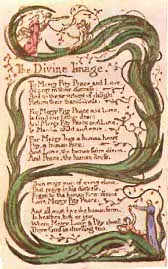Songs of Innocence and Experience Contents
- Social / political context
- Religious / philosophical context
- Literary context
- Textual history
- Songs of Innocence
- Introduction (I)
- The Shepherd
- The Ecchoing Green
- The Lamb
- The little black boy
- The Blossom
- The chimney sweeper (I)
- The little boy lost (I)
- The Little Boy Found
- Laughing song
- A Cradle Song
- The Divine Image
- Holy Thursday (I)
- Night
- Spring
- Nurse's Song (I)
- Infant Joy
- A Dream
- On Another's Sorrow
- Songs of Experience
- Introduction (E)
- Earth's Answer
- The Clod and the Pebble
- Holy Thursday (E)
- The Little Girl Lost
- The Little Girl Found
- The Chimney Sweeper (E)
- Nurse's Song (E)
- The Sick Rose
- The Fly
- The Angel
- The Tyger
- My Pretty Rose-tree
- Ah! Sun-flower
- The Lilly
- The Garden of Love
- The Little Vagabond
- London
- The Human Abstract
- Infant Sorrow
- A Poison Tree
- A Little Boy Lost (E)
- A Little Girl Lost
- To Tirzah
- The Schoolboy
- The Voice of the Ancient Bard
- A Divine Image
The Divine Image - Synopsis and commentary
Synopsis of The Divine Image

The speaker states that all people pray to Mercy, Pity, Peace, and Love in times of distress and then thank them for blessings. When humans pray to ‘God, our father dear' it is these qualities of heart they are praying to and thanking. These are also, however, the characteristics of humanity. Therefore, all prayers to Mercy, Pity, Peace, and Love are directed not just to God but to ‘the human form divine,' which should be regarded with love and respect by all people, regardless of their religion or culture.
This poem follows A Cradle Song, which has considered the idea of God becoming one with human beings through a recognisable human situation. It takes up the same theme from a different angle, asking readers to question what is meant by the idea that human beings are reflections of God.
Commentary
Praising God and humankind
The speaker praises both God and humanity and asserts an identity between the two. The poem seems to emphasize that the qualities of Mercy, Pity, Peace, and Love are precisely what people are thinking of when they speak of God. It also suggests that there are only gentle qualities in ‘God, our father dear'; there is no wrath, fierce energy or anything suggesting power or mightiness. In this way, many of the elements seen in the natural world seem excluded from the picture of God. It is as if the God depicted in The Divine Image is the father of lambs but not the father of tigers (See The Lamb and The Tyger)
God within humankind
Blake believed that ‘all deities reside in the human breast', and that God primarily dwells within humanity, rather than as a force beyond and above it. Hence Mercy, Pity, Peace and Love are also equivalent to humanity. All that can be known of God is found within human beings. Therefore:
- Humans are worthy of reverence
- They have a basic equality which provides the basis for a universal human brotherhood.
An incomplete view
Because this poem represents some of Blake's beliefs about the indwelling of God and consequent universal brotherhood, it is tempting to interpret it simply as a statement of Blake's belief. The phrase ‘all must love' can be interpreted as a declaration about how humans are bound to love the human form, as much as an imperative that they should.
However:
- According to Blake, any view of God, and consequently of humanity, is partial
- Perhaps pity and mercy would not be necessary in a world in which everyone was truly treated as divine and as a brother or sister. This is what Blake suggests in the companion Song of Experience, The Human Abstract
- The viewpoint of innocence, whilst not untrue, is not a complete vision of life.
Investigating The Divine Image
- Write some brief definitions of the terms Mercy, Pity, Peace, and Love
- Discuss your findings
- Try and find some current news stories that reflect each quality
- How far do you agree with the speaker's innocent perspective that these four qualities are representative of humanity?
